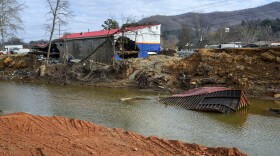President Trump is hoping to reshape the U.S.'s trade relationships with other countries and revitalize U.S. manufacturing, and so far he's using tariffs as his main tool.
But the tariffs have been, for lack of a better phrase, freaking out some business owners, especially those who import goods from China. Goods from there have been hit with a 145% tariff.
Michelle Tunno Buelow is one of those impacted business owners. She's the founder and owner of Bella Tuno. It's one of the Charlotte region's fastest growing companies selling baby and parent products. She spoke with WFAE's Nick de la Canal about how the tariffs are squeezing her company.
Nick de la Canal: So first, some background, you started your company 20 years ago in 2005. What kinds of products did you start out with?
Michelle Tunno Buelow: When I started the company, it was all USA-made products, and at that point, we were pretty limited to soft goods. And on top of that, I was, I was sewing the products myself, so very simple products, things that had square corners.
We had burp cloths, we had changing pads, and we had — kind of what put us on the map — the little pacifier holder, and we were a three-horse circus. That's all we had for about the first two years.
De la Canal: OK, so nowadays, you know, people can go to your website or your Amazon store and buy baby bibs, plates, teething toys, and the company donates meals to hungry children with every product sold.
Buelow: That's right. We've actually — I've got to put in a little plug for our team and all our partners — we've donated 14 million meals to date, and the way we do that is we give one meal for every single product sold.
De la Canal: Yeah, really nice. So I have a two-part question. One, how many of your products today are manufactured in China? And two, how are these tariffs impacting the biz?
Buelow: So, we have four main product categories. We have teething and feeding, which is all our silicone products, and then we have plush — stuffed animals — and we have soft goods. Soft goods are wearables — towels, blankets, swaddles, bibs.
Everything other than the soft goods, they're all made in China. That puts 90% of our products in China.
It's literally like being financially waterboarded. Right now, if you look at a product like the "Wonder Bib," we are selling it for $7 to our wholesale customers, $14 direct to consumer.
With these tariffs coming in that are 145%, that's on top of the 15% that we already have to pay. So they're now 160% higher.
We would have to sell our bib for more than double, and we would never double the price. I mean, our plan is to take our prices up 10% in June because we're trying to average out the margins. We're trying to do what's best for our consumer. We're always consumer first, but it's crushing.
De la Canal: So President Trump has said if you want to avoid the tariffs, just manufacture in the US. Can you do that?
Buelow: Absolutely not, and it's not for lack of trying. We tried to bring this process to the U.S. We tried to bring it back when we heard tariffs were impending, and, we got 10 different companies. Tried to reach out to them.
Only two of them make baby products. Only one of them wanted to talk with us and give us a quote. When we did get the quote, the product cost was five times more expensive.
So I mean, unless someone wants to pay 70 some dollars for a bib, it just can't happen.
De la Canal: The infant and child product industry is one of the most vulnerable, with some 70% of products imported from China, according to news reports. How are you trying to prepare for whatever comes in the next month or so and what are you seeing and hearing from your industry peers?
Buelow: It's kind of a sitting and waiting game. All of ... I have a big group of CEO friends and founder friends and everyone's trying their best to pick the country that they think is going to be the one that can not only support their product offering but also is going to be slightly resistant to the tariffs, but nobody knows.







